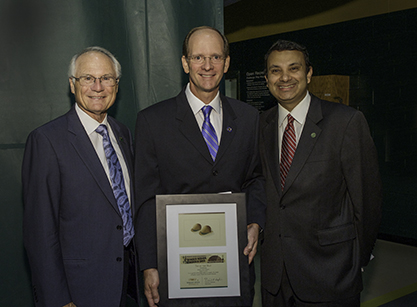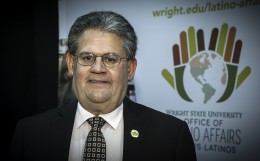
During the Regional Summit, Wright State President David R. Hopkins and Provost S. Narayanan recognized State Sen. Chris Widener for helping secure funding to create jobs and commercialization opportunities in the region.
A peek at the new model of higher education, details of job-creation efforts surrounding military agencies, a new university aerospace leader, initiatives to help immigrants and tips for businesses to make more effective use of technology.
These were the highlights at Wright State University’s annual Regional Summit on Aug. 15. Educators, business leaders and elected officials from around the region attended, filling the McLin Gymnasium at the Wright State Nutter Center.
Wright State President David R. Hopkins said universities must have multiple missions that include producing both talented graduates and commercialized research that drive economic prosperity.
“I’m so proud that this Regional Summit has helped us accelerate our ability to work with you and do just that,” Hopkins told the audience.
State Sen. Chris Widener said the new Federal Military Jobs Commission created in the latest state budget will develop an aggressive statewide strategy to create and retain jobs surrounding federal military agencies in Ohio.

Regional Summit participants discussed the challenges facing business in technology and professional development.
The nine-member commission, which will include representatives from the Dayton region, will also partner with public and private ventures to ensure that jobs created by research stay in Ohio. In addition, the panel will help small businesses in Ohio work to obtain military contracts.
Hopkins presented Widener with a Wright State “Tip of the Hat” award to recognize him as a person who goes beyond the call of duty to serve other people, specifically for helping secure funding to create jobs and commercialization opportunities in the region.
During the summit, it was announced that Col. Cassie Barlow, former 88th Air Base Wing and Installation commander at Wright-Patterson Air Force Base, will join Wright State as executive director of the university’s Aerospace Professional Development Center.
Barlow called it an amazing opportunity to make a difference at a time of defense downsizing.
“This is a critical time to make the connection between defense and academia, help with that pipeline for what’s coming next,” she said. “What can we do to attract those people who are getting out of defense right now? Ohio can be a leader in this.”
Dayton City Commissioner Matt Joseph briefed the audience on the Welcome Dayton Plan, designed to engage new immigrants in strengthening the economy. He noted that two of every three immigrants in Dayton have advanced degrees and that the immigration population in the city jumped 40.3 percent between 2011 and 2012.

Tony Ortiz, associate vice president of Latino affairs, announced plans to create the Midwest Consortium on Immigrant Research Institute at Wright State.
Tony Ortiz, Wright State’s associate vice president of Latino affairs, announced plans to create the Midwest Consortium on Immigrant Research Institute, which will track the economic impact of immigrants.
And Kristin Sobolik, dean of the College of Liberal Arts, announced plans to create the Wright State Language Institute, designed to support immigrants by providing English language and American culture skills.
Participants broke into small groups to discuss the challenges facing business in technology and professional development. Their insights included:
- Technology can increase recruitment and retention, but can be expensive and produce massive amounts of data that must be analyzed to be useful. Businesses must guard against using technology at the expense of human interaction, which brings energy and creativity to the workplace.
- Employees should be hired for attitude and trained for skills. Businesses should clearly define their missions to each employee to make them feel invested and help them set goals and a career path. Strong managers and mentors are important.
Speakers at the summit also included State Sen. Bill Beagle; Dennis Andersh, chief operating officer of the Wright State Research Institute; and Michael Wiehe, director of Wright State’s Center for Urban and Public Affairs.
A panel on globalization included Barlow; State Sen. Peggy Lehner; Lauren McGarity, globalization liaison for the Ohio Board of Regents; Erik Collins, director of community and economic development for Montgomery County; Jared Ebbing, director of community/economic development for Mercer County; Pete Williams, economic development specialist for Greene County; and Michelle Streeter-Ferrari, director of Wright State’s Center of International Education.
The annual Regional Summit, which began in 2007, is designed to connect Wright State with top business leaders of the region. The university has used feedback from the summits to help shape its programs and initiatives.

 Nearly 1,500 students graduate at Wright State’s spring commencement ceremonies
Nearly 1,500 students graduate at Wright State’s spring commencement ceremonies  Wright State University and Premier Health more closely align operations, creating a transformational partnership
Wright State University and Premier Health more closely align operations, creating a transformational partnership  Bottom Line, Wright State partnership aims to increase access to college
Bottom Line, Wright State partnership aims to increase access to college  Wright State’s nursing program celebrates 50th anniversary
Wright State’s nursing program celebrates 50th anniversary  Wright State celebrates Student Success Champions
Wright State celebrates Student Success Champions 